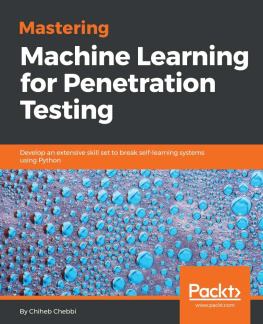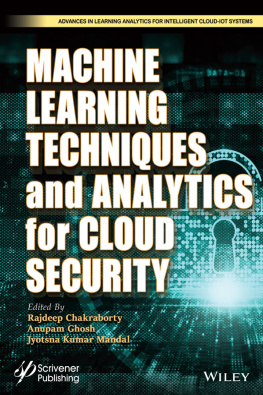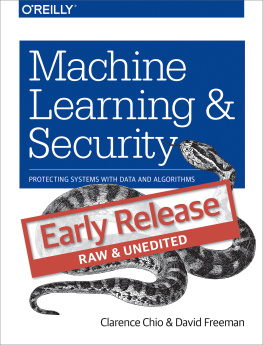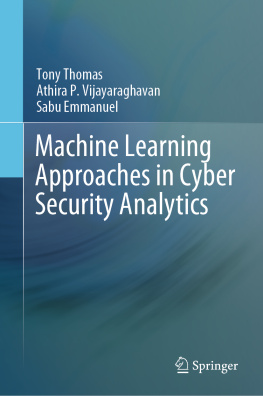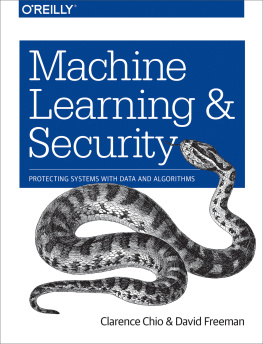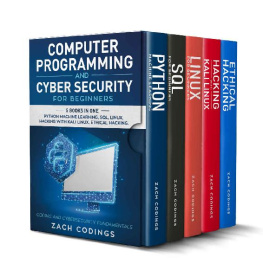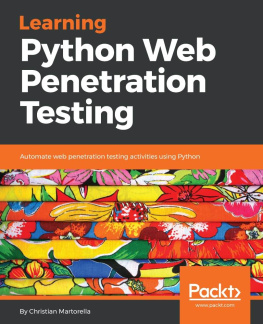Mastering Machine Learning for Penetration Testing
Develop an extensive skill set to break self-learning systems using Python
Chiheb Chebbi

BIRMINGHAM - MUMBAI
Mastering Machine Learning for Penetration Testing
Copyright 2018 Packt Publishing
All rights reserved. No part of this book may be reproduced, stored in a retrieval system, or transmitted in any form or by any means, without the prior written permission of the publisher, except in the case of brief quotations embedded in critical articles or reviews.
Every effort has been made in the preparation of this book to ensure the accuracy of the information presented. However, the information contained in this book is sold without warranty, either express or implied. Neither the author, nor Packt Publishing or its dealers and distributors, will be held liable for any damages caused or alleged to have been caused directly or indirectly by this book.
Packt Publishing has endeavored to provide trademark information about all of the companies and products mentioned in this book by the appropriate use of capitals. However, Packt Publishing cannot guarantee the accuracy of this information.
Commissioning Editor: Vijin Boricha
Acquisition Editor: Heramb Bhavsar
Content Development Editor: Nithin George Varghese
Technical Editor: Komal Karne
Copy Editor: Safis Editing
Project Coordinator: Virginia Dias
Proofreader: Safis Editing
Indexer: Tejal Daruwale Soni
Graphics: Tom Scaria
Production Coordinator: Aparna Bhagat
First published: June 2018
Production reference: 1260618
Published by Packt Publishing Ltd.
Livery Place
35 Livery Street
Birmingham
B3 2PB, UK.
ISBN 978-1-78899-740-9
www.packtpub.com
I dedicate this book to every person who makes the security community awesome and fun!
mapt.io
Mapt is an online digital library that gives you full access to over 5,000 books and videos, as well as industry leading tools to help you plan your personal development and advance your career. For more information, please visit our website.
Why subscribe?
Spend less time learning and more time coding with practical eBooks and Videos from over 4,000 industry professionals
Improve your learning with Skill Plans built especially for you
Get a free eBook or video every month
Mapt is fully searchable
Copy and paste, print, and bookmark content
PacktPub.com
Did you know that Packt offers eBook versions of every book published, with PDF and ePub files available? You can upgrade to the eBook version at www.PacktPub.com and as a print book customer, you are entitled to a discount on the eBook copy. Get in touch with us at service@packtpub.com for more details.
At www.PacktPub.com , you can also read a collection of free technical articles, sign up for a range of free newsletters, and receive exclusive discounts and offers on Packt books and eBooks.
Contributors
About the author
Chiheb Chebbi is an InfoSec enthusiast who has experience in various aspects of information security, focusing on the investigation of advanced cyber attacks and researching cyber espionage and APT attacks. Chiheb is currently pursuing an engineering degree in computer science at TEK-UP university in Tunisia.
His core interests are infrastructure penetration testing, deep learning, and malware analysis. In 2016, he was included in the Alibaba Security Research Center Hall Of Fame. His talk proposals were accepted by DeepSec 2017, Blackhat Europe 2016, and many world-class information security conferences.
I would like to thank my parents and friends who have always been a great support. I'd like to extend my thanks to Packt folks, especially Nithin, Heramb, and Komal for giving me the opportunity to get involved in this book.
About the reviewer
Aditya Mukherjee is a proficient information security professional, cybersecurity speaker, entrepreneur, cybercrime investigator, and columnist.
He has 10+ years of experience in different leadership roles across information security domains with various reputed organizations, specializing in the implementation of cybersecurity solutions, cyber transformation projects, and solving problems associated with security architecture, framework, and policies.
Packt is searching for authors like you
If you're interested in becoming an author for Packt, please visit authors.packtpub.com and apply today. We have worked with thousands of developers and tech professionals, just like you, to help them share their insight with the global tech community. You can make a general application, apply for a specific hot topic that we are recruiting an author for, or submit your own idea.
Table of Contents
Preface
Currently, machine learning techniques are some of the hottest trends in information technology. They impact on every aspect of our lives, and they affect every industry and field. Machine learning is a cyber weapon for information security professionals. In this book, you will not only explore the fundamentals of machine learning techniques, but will also learn the secrets to building a fully functional machine learning security system; we will not stop at building defensive layers. We will explore how to attack machine learning models with adversarial learning. Mastering Machine Learning for Penetration Testing will provide educational as well as practical value.
Who this book is for
Mastering Machine Learning for Penetration Testing is for pen testers and security professionals who are interested in learning techniques for breaking an intelligent security system. A basic knowledge of Python is needed, but no prior knowledge of machine learning is necessary.
What this book covers
, Introduction to Machine Learning in Pentesting, introduces reader to the fundamental concepts of the different machine learning models and algorithms, in addition to learning how to evaluate them. It then shows us how to prepare a machine learning development environment using many data science Python libraries.
, Phishing Domain Detection, guides us on how to build machine learning models to detect phishing emails and spam attempts using different algorithms and natural language processing (NLP).
, Malware Detection with API Calls and PE Headers, explains the different approaches to analyzing malware and malicious software, and later introduces us to some different techniques for building a machine learning-based malware detector.
, Malware Detection with Deep Learning, extends what we learned in the previous chapter to explore how to build artificial neural networks and deep learning to detect malware.
, Botnet Detection with Machine Learning, demonstrates how to build a botnet detector using the previously discussed techniques and publicly available botnet traffic datasets.
, Machine Learning in Anomaly Detection Systems

